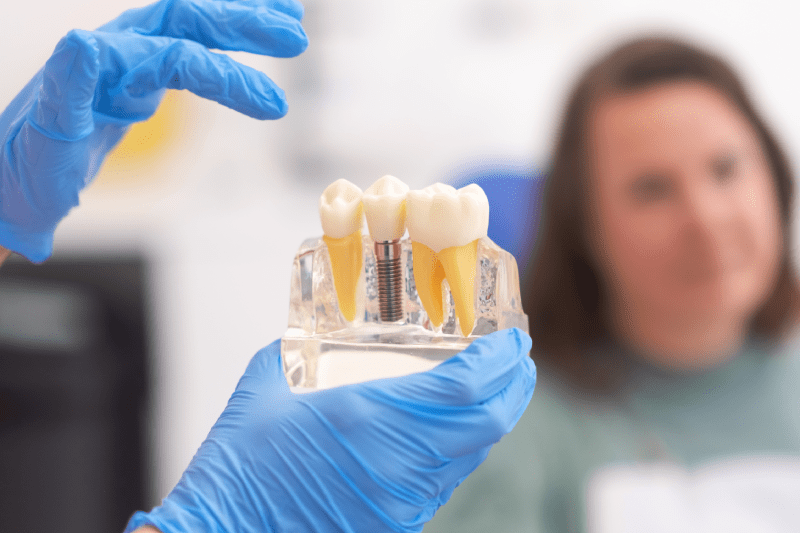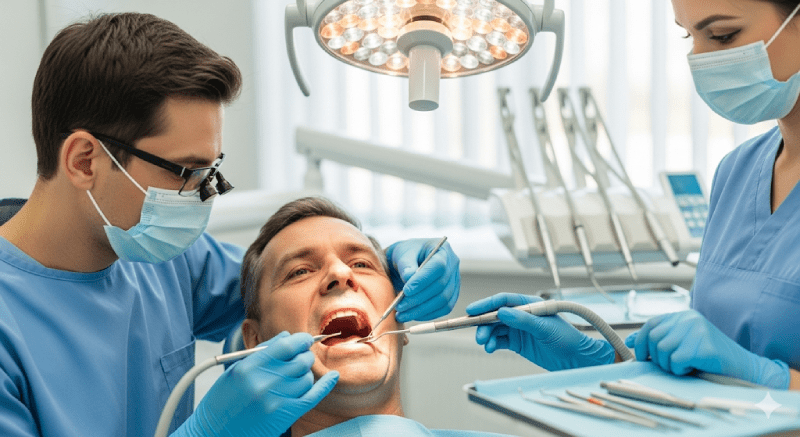What Is a Dental Implant?
A dental implant is an artificial root made of titanium or zirconium that is placed in the jawbone to replace missing teeth. This artificial root provides a solid foundation for the porcelain or zirconium crowns that will be placed on it.
Dental implants are a modern treatment method that provides the most aesthetically and functionally similar results to natural teeth. Dental implant treatment significantly improves the patient’s quality of life by restoring the chewing function, aesthetics, and speech ability of the lost tooth. The success of the treatment depends on the quality of the implant and the surgeon’s experience.
What Is the Average Cost of a Dental Implant in Germany?
The average cost of a dental implant in Germany is at a similar level to other Western European countries and is generally quite high. The price of a dental implant varies depending on the brand of the implant used, the city where the dental clinic is located, and the surgeon’s experience.
On average, the total cost for a single dental implant, including the implant and the crown to be placed on it, can range from 2,000 to 5,000 Euros. This pricing generally covers the entire treatment process, including the surgical operation, the implant, and the crown.
What Factors Affect Implant Prices?
There are many factors that affect dental implant prices in Germany. The most important of these are the brand and quality of the implant used. Internationally recognized brands like Straumann and Nobel Biocare are more expensive, while less-known brands may be more affordable. Additionally, factors such as the surgeon’s experience and level of expertise, the clinic’s location (larger cities are more expensive), whether additional procedures (bone grafting, sinus lifting) are required, and the material of the prosthesis also directly affect the price.
What Are the Reasons for the Extremely High Cost of Implant Treatment?
The cost of dental implant treatment in Germany is generally due to high living standards and operating costs. Factors such as high labor costs, the high cost of medical equipment and materials, taxes, and insurance premiums drive up prices. Furthermore, the quality-oriented structure of the German healthcare system requires that the materials and treatment used are of high standards, which is reflected in the cost. Patients often have to resort to private insurance to cover these high costs.
Is Implant Treatment Covered by German Health Insurance?
In Germany, statutory health insurance (GKV) does not cover the full cost of implant treatment. The insurance only covers the “basic care,” which is the simplest solution legally required to replace the tooth. This usually includes solutions such as a fixed bridge or a partial denture. Implant treatment is generally considered an additional expense that must be covered by the patient. Therefore, patients need to have private supplementary insurance (Zusatzversicherung) or pay for the costs out of their own pockets.
Is Supplementary Insurance Necessary for a Dental Implant?
Getting supplementary insurance (Zusatzversicherung) is very beneficial for those considering implant treatment in Germany. These insurances can cover a portion or all of the implant costs not covered by statutory health insurance. Supplementary insurance policies can provide a reimbursement of between 50 and 90 percent of the implant’s price. However, these insurances usually become active after a certain waiting period (Wartezeit), so it is important to carefully review the coverage and conditions of the insurance before starting the treatment.
What Are the Most Popular Implant Brands in Germany?
Dental clinics in Germany generally prefer internationally recognized implant brands that have proven reliability and quality. Among these brands, Swiss-based Straumann and Nobel Biocare stand out. Additionally, German brands like Camlog and Ankylos are also frequently used. These brands produce implants supported by years of clinical research and have high success rates. Dentists determine the most suitable brand for the patient’s jaw structure and budget.
How Long Does Implant Surgery Take?
The placement of a single dental implant is usually a simple surgical procedure that takes between 30 minutes and 1 hour. If more than one implant is to be placed in the same session or if additional procedures like bone grafting are to be performed, the surgery time may be extended. Implant surgery is generally performed under local anesthesia, and the patient does not feel any pain. The planning and preparation process is important for the patient’s comfort and the success of the operation.
How Is Implant Treatment Performed in Germany?
Implant treatment in Germany consists of several meticulously planned stages. In the first stage, a detailed examination and radiological scans (3D tomography) are performed. In the second stage, the implant is placed into the jawbone under local anesthesia, and a waiting period of 3 to 6 months is observed for the implant to fuse with the bone (osseointegration). In the final stage, the permanent dental prosthesis made of porcelain or zirconium is placed on the implant.

How Many Stages Does the Treatment Process Consist Of?
Dental implant treatment generally consists of three main stages. The first stage is the surgical placement of the implant into the jawbone. The second stage is the waiting period for the implant to fuse with the bone (osseointegration). This process can take 3 to 6 months. The third and final stage is the placement of the prosthesis (dental crown) on the implant. In some cases, all procedures can be completed in a single session.
Is It a Painful Procedure?
Thanks to the local anesthesia applied during the dental implant surgery, the patient does not feel any pain or discomfort. Only a slight sting may be felt during the injection. Mild pain and swelling are normal for the first few days after the surgery. This discomfort can be easily controlled with painkillers prescribed by the dentist and usually goes away on its own within a few days.
How Does the Recovery Process Work?
The recovery process after implant surgery is generally fast and smooth. Mild swelling and bruising may be seen within the first 24-48 hours. It is important for patients to consume soft foods and pay attention to oral hygiene for the first few days. The process of the implant fusing with the bone (osseointegration) can take 3 to 6 months. During this process, the stability of the implant is ensured, and then the prosthesis placement stage is started.
When Is the Permanent Tooth Placed?
The placement of the permanent tooth (crown) is done after the implant has fully fused with the jawbone (osseointegration). This process usually takes 3 to 6 months. If the implant is of the type that can be loaded immediately, a temporary tooth can be placed right away. This helps to meet the patient’s aesthetic and functional needs immediately.
What Is the Cost of Bone Grafting in Germany?
For patients with insufficient bone density in the jaw, a bone grafting (adding bone powder) procedure may be required before implant placement. In Germany, the cost of this procedure can vary from 500 to 1,500 Euros, depending on the amount of bone graft to be used and the surgeon’s fee. This procedure is of critical importance for the long-term success of the implant and can significantly increase the total cost.
What Is the Lifespan of Implants?
Dental implants that are properly placed and well-maintained can be used for a lifetime. The lifespan of the implant depends on the patient’s oral hygiene, whether they go for regular dental check-ups, and whether they have bad habits like smoking. While the implant itself is permanent, the prosthesis (crown) placed on it may wear out over time and may need to be replaced after 10-15 years.
Who Is a Suitable Candidate for a Dental Implant?
The most suitable candidates for a dental implant are individuals with sufficient jawbone density and who are in good general health. The risks may increase for patients with chronic illnesses such as severe uncontrolled diabetes, heart disease, or immune system problems. Smokers are also advised to quit smoking before the implant, as it negatively affects the healing process.
What Is the Most Suitable Age Range for Implant Treatment?
There is no definitive upper age limit for dental implant treatment. The important thing is that the person’s general health condition is at a level that can withstand the surgery. The most suitable age range is individuals aged 18 and over, where jawbone development has been completed. This ensures that the implant is placed in a stable manner.
Are Additional Services Offered for Patients from Abroad?
Some dental clinics in Germany may offer special services for patients coming from abroad, but these services are generally not as comprehensive as those in Turkey. Patients from abroad usually have to organize their own travel, accommodation, and transfers. However, since the English-speaking rate is high, communication problems are not experienced.
What Is the Experience of Dentists in Germany Like?
German dentists are professionals who have received high-standard training and work meticulously. Continuous professional development and the use of advanced technology constantly increase their level of expertise. In Germany, dentistry is in a respected position worldwide in terms of quality and reliability.
What Is the Relationship Between Implant Price and Quality?
In Germany, high prices are generally considered an indicator of high quality. More expensive clinics generally use the latest technologies and the highest quality materials. However, this does not mean that more affordable clinics are of low quality. The price is also affected by factors such as the clinic’s location, brand preferences, and the surgeon’s popularity.
What Tests Are Done Before Implant Treatment?
Before implant treatment, the patient’s general health condition and jawbone structure are examined in detail. Imaging tests such as panoramic X-rays and 3D tomography are performed to determine bone density and the anatomical structure of the area where the implant will be placed. Additionally, a blood test and a general health check-up are also important for the safe performance of the operation.
What Type of Teeth Are Placed on the Implant?
The teeth to be placed on the implant are generally made of porcelain or zirconium. Porcelain crowns offer aesthetics closest to natural teeth and reflect light like natural teeth. Zirconium crowns, on the other hand, are a more durable and biocompatible material than porcelain, which makes them more resistant to chewing forces. The choice of material is made according to the patient’s aesthetic expectations and budget.
How to Choose a Dental Clinic in Germany?
When choosing a dental clinic in Germany, it is important to research the clinic’s accreditations, the dentists’ areas of expertise, and their experience. Reading patient reviews, examining the clinics’ websites, and making an appointment for an initial consultation will help you make the right decision. Getting price quotes from various clinics and comparing them can also be beneficial.
What Should Oral Care Be Like After Implant Treatment?
Oral care after implant treatment is of vital importance for the long life of the implant. Teeth should be brushed at least twice a day and dental floss should be used. Additionally, special brushes or an oral irrigator can be used to clean around the implant. Going for regular dental check-ups and getting professional cleaning is also important.

Can X-rays Be Taken with a Dental Implant?
Yes, there is no harm in getting an X-ray or MRI with dental implants. The materials used in implant production, such as titanium and zirconium, are biocompatible and non-magnetic substances. Therefore, they are not affected by MRI devices and do not pose any risk to the body.
Are There Different Treatments from Traditional Implants in Germany?
In addition to traditional methods, more comprehensive and modern techniques such as All-on-4 or All-on-6 are also used in implant treatment in Germany. These techniques involve placing a fixed prosthesis covering the entire jaw on four or six implants for patients who have lost all their teeth. This method allows patients to have a fixed and aesthetic tooth in a single session.
How Long Do I Need to Stay in Germany for Dental Implant Treatment?
Since dental implant treatment in Germany is a gradual process, a single trip may not be enough. A few days are sufficient for the first stage (placement of the implant). However, a period of 3-6 months is required for the implant to fuse with the bone. At the end of this period, a second visit may be necessary for the placement of the prosthesis.
Is a Dental Implant Covered by a Warranty in Germany?
Many dental clinics in Germany provide a warranty for the implant treatment they perform. This warranty period can vary between 5 and 10 years, depending on the implant brand used and the clinic’s policy. The warranty conditions usually cover free re-treatment or repair in case the implant fails or breaks. It is important to ask about the warranty conditions beforehand.
Does Quality of Life Increase After Implant Treatment in Germany?
Yes, a successful dental implant treatment significantly increases the quality of life of patients. Implants restore the chewing function of the lost tooth, which allows patients to eat more comfortably. Additionally, having a more aesthetically pleasing smile increases a person’s self-confidence and positively affects their social life.
When Is the Best Time for an Implant in Germany?
Dental implant treatment can be performed in any season. However, if you plan to stay in the sun for a long time after the treatment, it may be better to plan the surgery for the autumn or winter months to avoid negatively affecting the healing process. In general, the patient’s personal schedule and plans are the most important factors.
Is There a Waiting Period for Implant Treatment in Germany?
The waiting period for dental implant treatment in Germany varies depending on the clinic’s busyness and the dentist’s availability. Appointment systems are generally very organized, and there are no long waiting periods. However, you may have to wait for a few weeks, especially at popular and busy clinics.
What Factors Affect the Success of Implant Treatment?
The most important factors affecting the success of implant treatment are the surgeon’s experience, the quality of the implant used, the patient’s general health condition, and bone density. Additionally, the patient’s compliance with post-operative instructions and the care they give to oral hygiene are of critical importance for the long-term continuation of success.
What Foods Can Be Eaten After Implant Treatment?
In the first few days after implant surgery, only soft and liquid foods should be consumed. Foods like soups, yogurt, purees, and ice cream are suitable. As the healing process progresses, one can gradually return to a normal diet. It is important to avoid hard, sticky, or spicy foods that will strain the implant area.
Why Is Choosing Germany for Implant Treatment Advantageous?
Choosing Germany for implant treatment offers high-quality medical services and a reliable healthcare system. Patients have the advantage of being treated by experienced surgeons and with modern technologies. The treatment process is meticulously managed, and potential risks are minimized. However, these advantages come with higher costs.
How Does Implant Treatment Start in Germany?
To start dental implant treatment in Germany, one first contacts a dental clinic. Information about the patient’s medical history and dental health status is obtained. After the necessary examination and imaging tests are done, a personalized treatment plan and cost estimate are prepared by the dentist. The treatment begins after the patient approves this plan.


